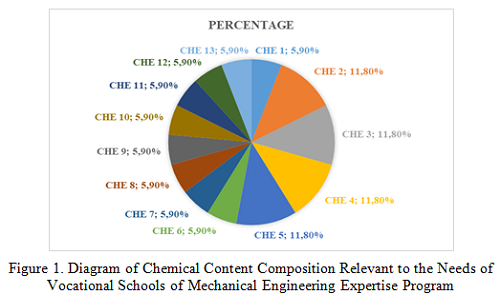
Reconstruction of Chemistry Curriculum Elements of Vocational School (SMK) of Mechanical Engineering Study Program
Abstract
Keywords
Full Text:
PDFReferences
Aeni, N. (2019). Pengembangan Modul Bermuatan Pendidikan Karakter materi Elektrokimia Program Keahlian Teknik Instalasi Tenaga Listrik. Journal of Educational Chemistry (JEC), 1(2), 69-81.
Anderson, L. A., & Krathwohl, D. R. (2017). Kerangka Landasan untuk Pembelajaran, Pengajaran, dan Asesmen. Yogyakarta: Pustaka Pelajar.
Arungpadang, T. A., Longdong, J., & Patras, L. S. (2018). Analisa Swot pada Pembelajaran Kimia dalam Bidang Teknik Mesin. Jurnal Tekno Mesin, 5(1).
Boddey, K., & de Berg, K. (2015). The impact of nursing students' prior chemistry experience on academic performance and perception of relevance in a health science course. Chemistry Education Research and Practice, 16(2), 212-227.
Efstratia, D. (2014). Experiential education through project based learning. Procedia-social and behavioral sciences, 152, 1256-1260.
Fauzan. (2017). Kurikulum dan Pembelajaran. Ciputat: GP Press.
Firman, H. (2018). Asesmen Pembelajaran Kimia. Bandung: Program Studi Pendidikan Kimia Sekolah Pascasarjana UPI.
Hartanto, S., & Fordiana, R. (2018). Learning Need Analysis of Vocational High School’s Chemical Subject in Mechanical Engineering Departement. International Journal of Engineering and Technology, 7(3.25), 656-658.
Haryanti & Wiyarsi, A. (2017). Analisis Minat Belajar Kimia Siswa Kelas XI SMK Negeri 1 Temon. In Prosiding Seminar Nasional Kimia UNY 2017 (pp. 67-73).
Hrmo, R., Miština, J., & Krištofiaková, L. (2016). Improving the quality of technical and vocational education in Slovakia for European labour market needs. International Journal of Engineering Pedagogy (iJEP), 6(2), 14-22.
Jansson, S., Söderström, H., Andersson, P. L., & Nording, M. L. (2015). Implementation of problem-based learning in environmental chemistry. Journal of Chemical Education, 92(12), 2080-2086.
Jatmoko, D. (2013). Relevansi kurikulum SMK kompetensi keahlian teknik kendaraan ringan terhadap kebutuhan dunia industri di Kabupaten Sleman. Jurnal Pendidikan Vokasi, 3(1).
Kastawi, N., Widodo, S., & Mulyaningrum, E. (2017). Kendala dalam implementasi kurikulum 2013 di Jawa Tengah dan strategi penanganannya. Indonesian Journal of Curriculum and Educational Technology Studies, 5(2), 66-76.
Kemendikbud. (2018). Lampiran 1 Peraturan Direktur Jendral Pendidikan Dasar dan Menengah Nomor: 07/D.D5/KK/2018 Tentang Struktur Kurikulum Sekolah Menengah Kejuruan (SMK)/ Madrasah Aliyah Kejuruan (MAK). Jakarta: Kementerian Pendidikan dan Kebudayaan.
Kemendikbud. (2018). Lampiran Perdirjen Dikdasmen No. 464/D.D5/KR/2018 Tahun 2018 Tentang Kompetensi Inti dan Kompetensi Dasar Mata Pelajaran Muatan Nasional (A), Mutan Kewilayahan (B), Dasar Program Keahlian (C2) dan Kompetensi Keahlian (C3). Jakarta: Kementerian Pendidikan dan kebudayaan.
Lia, R. M., & Isnaeni, W. (2018). Evaluation of Chemistry learning programs at vocational high school Semarang on Vehicle Engineering field. Proceeding Advances In Social Science and Humanities Research, 247, 403-407.
Maxwell, D. O., Lambeth, D. T., & Cox, J. T. (2015, June). Effects of using inquiry-based learning on science achievement for fifth-grade students. In Asia-Pacific Forum on Science Learning and Teaching (Vol. 16, No. 1, pp. 1-31). The Education University of Hong Kong, Department of Science and Environmental Studies.
Miatun, A. (2018). The effect of discovery learning and problem-based learning on middle school students’ self-regulated learning. In Journal of Physics: Conference Series (Vol. 948, No. 1, p. 012021). IOP Publishing.
Murwindra, R., Yuhelman, N., & Musdansi, D. P. (2017). Implementasi Kurikulum 2013 pada pembelajaran kimia di SMKN 1 Teluk Kuantan. JIPVA (Jurnal Pendidikan IPA Veteran), 1(1), 51-61.
Setiadi, H. (2016). Pelaksanaan penilaian pada Kurikulum 2013. Jurnal Penelitian dan Evaluasi Pendidikan, 20(2), 166-178.
Sönmez, M. (2014, July). Shall We Continue Keeping High School Courses in Mechanical Engineering Curriculum?. In Engineering Systems Design and Analysis (Vol. 45837, p. V001T08A002). American Society of Mechanical Engineers.
Sugiyono. (2015). Metode Penelitian Pendidikan. Bandung: Alfabeta.
Widodo, W. (2017). Efektifitas penggunaan bahan ajar berbasis kontekstual berbantuan video pembelajaran untuk smk teknik mesin pada materi elektrokimia. In Seminar Nasional Pendidikan IPA 2017 (Vol. 2).
Wiyarsi, A., Hendayana, S., Firman, H., & Anwar, S. (2015). Pengembangan Curriculum Knowledge Calon Teacher Melalui Analisis Konten Kimia Konteks Kejuruan. Jurnal Pendidikan Matematika dan Sains, 3(1), 30-38.
Yuliastini, I. B., Rahayu, S., Fajaroh, F., & Mansour, N. (2018). Effectiveness of pogil with ssi context on vocational high school students’ chemistry learning motivation. Jurnal Pendidikan IPA Indonesia, 7(1), 85-95.
DOI: http://dx.doi.org/10.31258/jes.5.4.p.622-637
Refbacks
- There are currently no refbacks.
Copyright (c) 2021 Ayya Sophia

This work is licensed under a Creative Commons Attribution 4.0 International License.
Publisher: FKIP Universitas Riau













